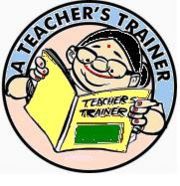INTERPERSONAL SKILLS OR SKILLS OF MANAGING HUMAN RELATIONSHIP
INTERPERSONAL SKILLS OR SKILLS OF MANAGING HUMAN RELATIONSHIP
A trainer deals with adult trainers. Managing human relationships on the training programme is a delicate but important aspect of trainer skills.
A trainer can choose from two approaches to the training programme and trainees.
o Trainer is authority figure.
o Trainer is the only source of knowledge and expertise.
o Trainer judges.
o Trainer talks, trainees listen.
o Trainer attempts to preserve authority.
o Trainer is a colleague.
o Trainer and trainee are co-sharers for knowledge and expertise.
o Trainer understands.
o Trainer considers listening as important as talking.
o Trainer tries to help trainees to develop autonomy.
Ideally, the trainer should not consider himself/herself as the giver of knowledge and the trainees as the receivers of knowledge. Classroom presentation should be a process for mutual give and take. The trainees opinions, views and needs should be considered, This not only facilitates good relationship and atmosphere in the class, but also gives the trainer valuable feedback about what to include in his/her presentations.
Recognizing the strengths of the trainees is more important than commenting on the weaknesses. For example, after observing an activity, it is more productive to begin with the strengths of the trainee. Any observations about error, mistakes or weaknesses should be made in a tactful manner, so that the feedback session too becomes a learning session, rather than just a judging session. The process of giving feedback should instil confidence among the trainees, make them relaxed enough to open themselves up to views of others.
ESTABLISHING LINKAGES
While organizing a programme a trainer may have to work in collaboration with outside agencies like NGOs VECs, the local administration or even other units in a DIET. It is necessary to take these agencies into confidence before hand to ensure their co-operation. Links can be established with the agencies in the following way
Open a dialogue with the agencies. Seek their co-operation officially. Make your objectives & expectations clear.
If you receive a negative reply make alternative arrangements immediately
If you receive no reply make a personal visit & discuss the issue with the person concerned
On receiving a reply, take Further action immediately.
There should be no delay in communication on your part.
After the programme send a “thank you” letter to the agencies concerned
Skills of Motivation
The Motivation level of the trainees has an influence on the success of the programme. If we meet a highly motivated group of trainees, they will participate fully in the programme. But more often than not, one are likely to meet a group that lacks motivation. It then becomes the responsibility of the trainer to motivate the group. Motivation level in a group depends on a number of factors.
- Clarity of the objectives of the training.
- The attitude of the trainer.
- The personal background of the Trainees.
- The physical setting, weather etc.
- Effectiveness of communication.
- The degree to which the topic of training relates to the needs of the Trainees perhaps a trainer does not have control over some of the factors listed above. For example, a trainer can do nothing about the personal life/problems of a trainee or the weather. A trainer can also do very little when two or more factors start working in combination. For example, the physical setting (a classroom with bad acoustics) can sometimes affect the effectiveness of the communication.
- But there are a few things a trainer can do to ensure a certain degree of positive motivation on the course.
- Inform the trainees about the programme well in advance so that they have time enough to reorganize their responsibilities, both professional and personal.
- Be considerate and see how best you can help them to settle in.
- Have a positive attitude and encouraging. There is nothing more de motivating than a cynical attitude on the part of the trainer.
- Avoid personality clashes.
- Make the physical setting as comfortable as possible
- Plan well, so that the objectives are clear to both you and the trainees
- Trainer to relate the course to the needs of the trainees as far as possible.
- Don’t distance yourself from the trainees adopt a collaborative approach and participate actively in the class.
- Make the physical setting as comfortable as possible
- Plan well, so that the objectives are clear to both you and the trainees
- Trainer to relate the course to the needs of the trainees as far as possible.
- Don’t distance yourself from the trainees adopt a collaborative approach and participate actively in the class.
|
Given are five factors that can motivate trainees on a programme. Reflect and add three more factors to the list. FACTORS AFFECTING MOTIVATION
|
|
Communication skills comprise verbal, visual, interpersonal skills, linkages and skills of motivation. Verbal skills include body language, Voice modulation, sequencing, integrating visuals, and simplicity and clarity of expression. Visuals skills mean the competency of using visual material (Transparency, chart, poster, video, slide-picture etc) in transaction. Establishing linkages is another crucial skill for a trainer in a DIET as primary education is now being considered the responsibility of the community. The foremost skill is “motivation”. Motivation communicates. The trainers need to develop all these skills by practice and try to develop them among the teachers too. |
|
For a detailed understanding, visit this Wiki Educator site: [[1]]Interpersonal Communication Prepare a one page summary of what you learnt from the site. |
You can download Activity Sheet from here

